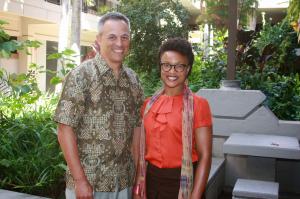UH Law School admitted to well-regarded environmental law academy
University of Hawaiʻi at MānoaThe William S. Richardson School of Law has been admitted to the prestigious International Union for Conservation of Nature Academy of Environmental Law. It represents 180 law faculties and research centers in over 50 nations.
Working to build environmental law education capacity on a worldwide scale, the Academy has an outstanding record of fostering research, collaboration and learning in environmental law in all regions of the globe. Its membership further opens the door to Richardson law students seeking to take advantage of their enormous potential for involvement in global environmental issues.
Said Dean Avi Soifer, “We are honored to be included as members of this stellar organization, which has done so much to advance the understanding of environmental law, environmental sustainability, and effective environmental governance. The Richardson Law School has an outstanding record in environmental law teaching and scholarship as well as in assisting in the development of improved environmental policy for Hawai‘i and the Pacific region. We look forward to making contributions to the Academy.”
The IUCN is headquartered at the University of Ottawa in Ontario, Canada. It has held international environmental conferences in Asia, Africa, Europe, North America and Australia to focus on issues including climate change, biofuels, water and the development of policy for protected areas.
The next World Conservation Congress – scheduled for September 2016 – will be held at the Hawai‘i Convention Center in Honolulu. This will be the first time in the Academy’s more than 60-year history that the U.S. has hosted this international gathering. Conferences are held every four years, with the last one taking place in 2012 in Jeju, the Republic of Korea.
Said Richardson Environmental Law Program (ELP) Director David Forman, “ELP looks forward to applying the considerable skills and energy of its faculty, lecturers and students in the interest of global conservation initiatives, while further tapping the expertise of Richardson’s Pacific Asian Legal Studies program and ASEAN Law Integration Center (ALIC).”
Associate Professor Shalanda H. Baker, ELP faculty advisor and founder of Richardson’s new energy law program, called the Law School’s inclusion in the Academy a major honor for the school.
“This is an unprecedented time to consider issues at the intersection of climate change and energy law and policy, which are of increasing relevance to global conservation efforts,” said Baker. “Hosting the IUCN Congress in Honolulu provides the state a unique opportunity to showcase our efforts to tackle all three concerns. At the Law School we are simply delighted to bring our expertise to bear in this important conversation.”
In 2011, the IUCN Academy received the American Bar Association Award for Distinguished Achievement in Environmental Law and Policy. The award honored the IUCN Academy’s significant contributions in the field of environmental law and policy, specifically in the areas of teaching, research and policy initiatives.
Said Professor Nicholas A. Robinson, who led the establishment of the IUCN Academy of Environmental Law, “It is a singular honor for the Academy to welcome the University of Hawai‘i’s Richardson School of Law. Its environmental law expertise is renowned worldwide.”
Robinson is University Professor on the Environment at Pace Law School in New York State. He is credited with developing that school’s highly rated environmental law program.
He added, “Richardson Law School’s depth of experience with international, as well as federal and state environmental law, as well as its insights into the traditional and customary laws in the Pacific islands, will contribute enormously to the comparative law studies of the Academy.”
Professor Robinson concluded by observing that “Hawai‘i’s participation in the Academy will bring scholars from around the world to Honolulu, beginning with those attending the 2016 World Conservation Congress of IUCN.”
For more information, visit: https://www.law.hawaii.edu/

